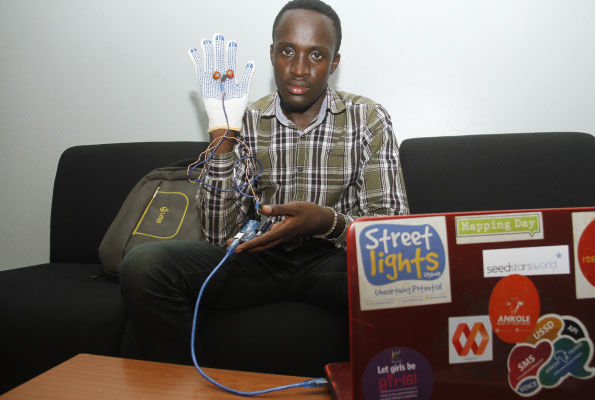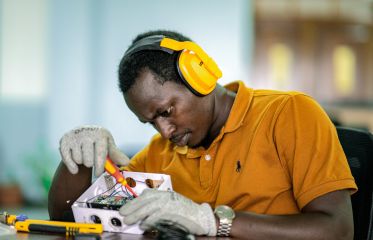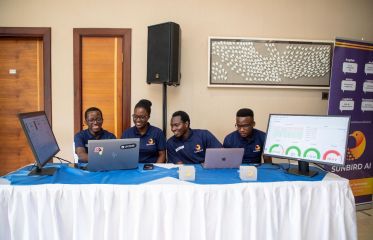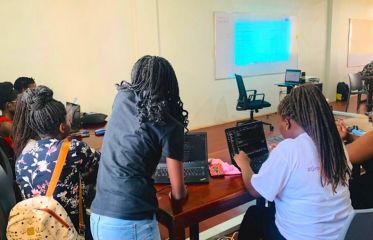Breaking News
- Sunbird AI Student Internship Program ...Read More
- Sunbird AI Fellows Program ...Read More
- Call for Applications for MOTIV Media Academy ...Read More
- Ground Breaker Full time Scholarship for girls to study Software Engineering ...Read More
- AU Digital and Innovation Fellowship - Cohort 2 ...Read More
- Apply to Women Institute of Technology and Innovation for 2024 Intake (Fully Funded) ...Read More
- Higher Education Students Financing Board Call for Student's Loan Application for AY 2023-2024 ...Read More
- Government Allied Health Training Institutions in Uganda ...Read More
- Government Nursing and Midwifery Training Institutions offering Diploma and Certificate Programs ...Read More
- Ministry of Education and Sports Mauritius - Africa Scholarship Scheme 2024 Edition ...Read More
Makerere students develop breast cancer detecting technology

Following the death of his grandfather to breast cancer, Moris Atwine, a third year Computer Science student at Makerere University together with two other students have developed technology that detects and stops the spread of the disease.
Atwine, 22, says together with his colleagues, Alvin Kabwama, a fourth year electric engineering student and David Mwesigwa, a third year computer science student decided to come up with the technology to ease cancer diagnosis mostly in people with a family history of the disease.
“Looking at the risk factors that lead to breast cancer, family history is one of the breast cancer causes. By developing this technology and smart mobile phone application, it could stop the spread of cancer in our family,” Atwine says.
Clinical trials
He adds that his grandfather succumbed to breast cancer in 2012 and in September 2014 that’s when the breast cancer technology dubbed: “Breast IT” was developed.
Atwine, who hails from Kyeitebe village in Bushenyi District, says currently the technology is being subjected to clinical trials across the country.
“We have so far done one trial at the Uganda Cancer Institute and depending on the results received, we have to improve on the accuracy of the software,” says Atwine.
He adds that the technology has registered 55 per cent efficacy and there are hopes of achieving 70 per cent accuracy by the end of year.
The Breast IT team is currently working with the Uganda Communications Commission to ensure that they meet the standards after winning a grant worth $5000 at this year’s Annual Communication Innovation Awards (ACIA) held in Kampala.
“We won the ICT for development category award and we are planning to have village booths where we can have very many people screened and tested for breast cancer in a short time,” says Atwine.
The innovators are working with the Uganda Industrial Research Institute to (UIRI) design the Breast IT technology into a final and improved medical diagnostic product.
“We have also exhibited the Breast IT technology at the annual Mozilla Festival which was graced by President Museveni,” says Atwine, adding that the President pledged to support one of their innovations, the malaria app.
According to Atwine, who is the leader of the project, the complete set of their product will cost about $450 (Shs1.5million) after it has met the various safety standards both local and international.
How 'breast IT' works
Atwine says the Breast IT technology is made up of both the software, a mobile phone application and the hardware which performs the cancer screening role.
“The hardware is a custom glove which is hovered the breast to detect the cancer.
It uses ultra sound waves to send the images to the mobile phone once it detects a lump or tumour,” he says
Alternatively, he adds that the technology also uses Bluetooth technology to transmit the images to the mobile phone from the glove.
“The software has a data base of different images so the images come from the glove to phone where they are analysed thus giving the results which appear on a smartphone screen,” says Atwine.
He adds that the hardware glove was designed and developed by their colleague, Kabwama, who hatched the idea from scratch due to his background in electric engineering.
“After the results are ready, they can be viewed and used by a radiotherapist or cancer specialist to determine the next move after interpreting them” says Atwine as he demonstrated how the glove is rotated around the breasts.
As far as delivering diagnosis, the Breast IT developers hope that the technology will help reduce the time patients spend waiting for results and also cut on transport costs incurred while seeking for cancer treatment and care.
“Instead of traveling from Kisoro to Kampala for treatment, the gadgets will help patients to cut on transport costs after training are have been set up in rural settings,” Atwine explains.
In addition to performing the screening function, the mobile phone app also provides visual illustrations on how to conduct a self-breast examination. It also provides information on the risk factors for cancer and how to avoid them.
The innovators believe that the Breast IT technology is needed as soon as possible to ease breast cancer treatment in Uganda for early detection since the major challenge remains late detection emerging out of diagnostic equipment absence.
However, the Minister of Health, Dr Tumwesigye says government has received a loan worth $33millionfrom the African Development Bank to procure cancer diagnostic equipment which will transform the cancer institute into a centre of excellence in Africa.
Top Courses Currently Admitting for January 2024
-
Bachelor of Guidance and Counseling
Ndejje University
-
Bachelor of Science in Software Engineering and Application Development
Bugema University
-
Bachelor of Information Technology
Ndejje University
-
Diploma in Project Planning and Management
Uganda Institute of Information and Communication Technology
-
Diploma in Business Education
Ndejje University































